North Campus, Guangdong University of Foreign Studies, December 12th, 2020: The 5th China (Guangdong) International Think Tank Forum of the 21st Century Maritime Silk Road (2020), co-sponsored by the Guangdong Institute for International Strategies, China Center for Contemporary World Studies, and directed by the Belt and Road Think Tank Cooperation Alliance, was inaugurated at Guangdong University of Foreign Studies. Online and offline events were held simultaneously.
Sui Guangjun, Party Secretary of the university, executive vice-president of the Guangdong Institute for International Strategies, and Wang liyong, deputy director of China Center for Contemporary World Studies and deputy Secretary General of the Belt and Road Think Tank Cooperation Alliance, were present at the meeting. Shi Youqi, President of GDUFS, inaugurated the opening ceremony. The forum topic was: “the 2020 Annual Research Report on the Construction of the 21st Century Maritime Silk Road: “the Belt and Road” Digital Economy Cooperation.”
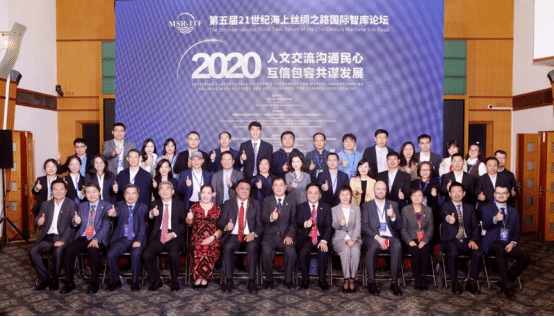
The 5th International Think Tank Forum
The theme of this forum was "People-to-People Exchange, Communication, Mutual Trust, Tolerance, and Common Development". There were 13 parallel forums. Topics such as the Belt and Road Initiative and Global Economic Governance, the Socio-Economic and External Relations of Pacific Island Countries under COVID-19, International Migration Governance and Development Trends were discussed. Hassan Gaforifard, former vice president of Iran; Guo Jun, deputy Secretary-General of the CPPCC National Committee; Tapsarai Toomata, Samoa's ambassador to China; Bochai Danviwata, Secretary-General of the Asian Cooperation Dialogue; Ji Peiding, former vice minister of foreign affairs, former president of China Diplomats Association as well as more than 100 universities and institutions from more over20 countries and regions along the Maritime Silk Road, a total of about 300 government officials, consul-general experts and scholars from Chinese and foreign think tanks represented business elites and representatives from international organizations, attended the forum.
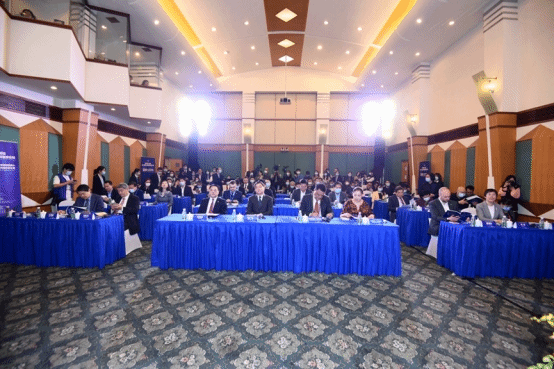
Site of the forum
Sui mentioned in his speech that the COVID-19 outbreak has had a profound impact to the whole world. Despite the challenges posed by the epidemic, China has been constantly promoting the transformation of the Belt and Road to a high-quality development. GDUFS responded positively to the Belt and Road initiative, deepening high-level international cooperation in education, and strengthening the construction of new high-end international think tanks. The 21st Century Maritime Silk Road Collaborative Innovation Center has been recognized as a national collaborative innovation center jointly built by provinces and ministries. In the future, the university will also continue to play the role of bridge for the Hess International Think Tank Forum, in order to enhance the exchange of civilization and mutual learning and the construction of a community of human destiny to provide strong intellectual support and talent protection.

Sui Guangjun spoke
Wang Liyong said that under the influence of the current climate of protectionism and unilateralism, it is essential to highlight the construction and flexibility of the Belt and Road. Decisions like strengthening the cooperation of economy and trade and promoting relationships with other nations are necessary. With the help of the Blue Economy, China will build a maritime shared community and create a new growth of One Belt and One Road for the global economy while avoiding misunderstandings.

Wang Liyong spoke
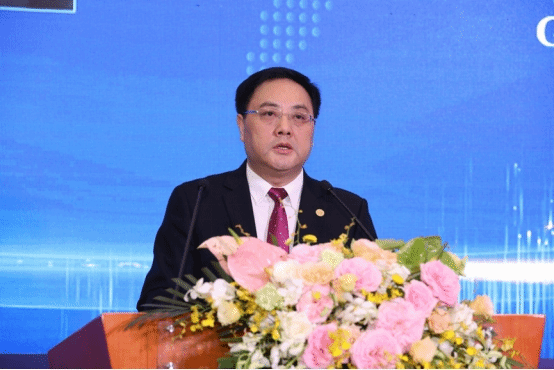
Shi youqi officiated at the opening
Hassan Ghaffrifard said in his keynote address, The Belt and Road Initiative (BRI) is one of the most successful mechanisms for bilateral and multilateral cooperation and has a far-reaching and broad significance in the economic, cultural and political fields. The One Belt and One Road initiative effectively promoted economic activity along the maritime silk route, to help enhance and optimize Asian and European transportation advantage, while also looking forward to the future in the process of developing offshore infrastructure, ensuringthe safety of sea lanes,guaranteeing the reduction of pollution and promising sustainable development.

Jiao Fangtai presided over the meeting
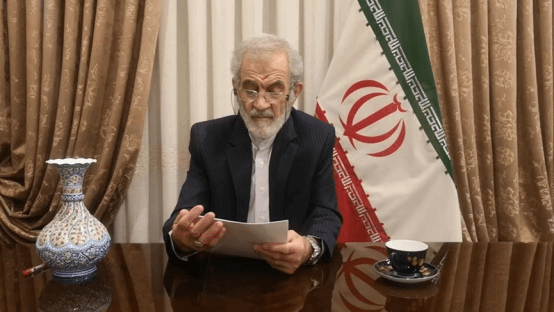
Hassan Ghaffrifard spoke
Guo Jun reviewed the development of the Maritime Silk Road, and pointed out it was a think-tank that would play the leading role to actively win the support for the programme. At the same time, Guangdong is expected to give full play to its unique geographical location, commercial advantages, business arteries and so on.
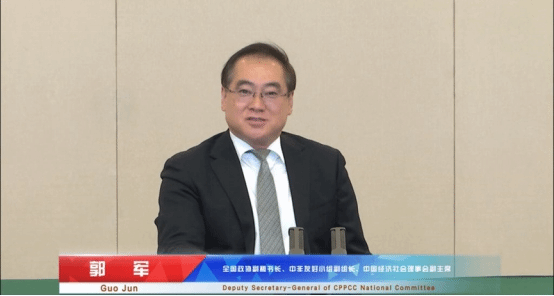
Guo Jun spoke
Ji Peiding stated that with the continuous development and the growth of new emerging markets, it is an inevitable trend that the gap between developed and developing countries is narrowing. We should hold a broader view of changes with an international perspective, strengthening cultural exchange and fighting COVID-19 together in the future.
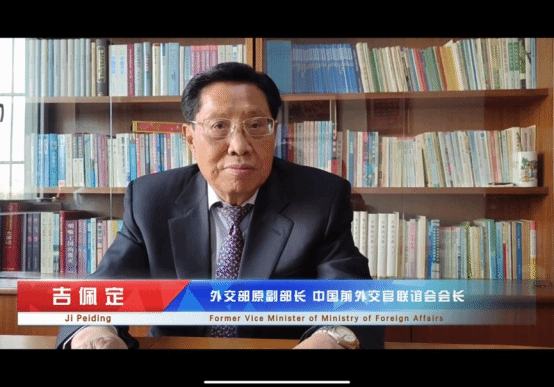
Ji peiding spoke
Bochai Danviwata suggested that promoting people-to-people exchange is an important part of foreign policy under the influence of the pandemic.Only mutual understanding between the State and the people can lay the foundation for trust to achieve common goals.

Bochai Danviwatam spoke
Tapusalaia Toomata expressed gratitude to China for providing medical supplies.Tapusalaia said that Samoa and other Pacific island countries have maintained friendship with China. China’s sharing medical supplies has provided strong support for Samoa's economic development. Facing the challenges of COVID-19 and climate change, Pacific island countries look forward to having a further cooperation with China through the Belt and Road initiative.
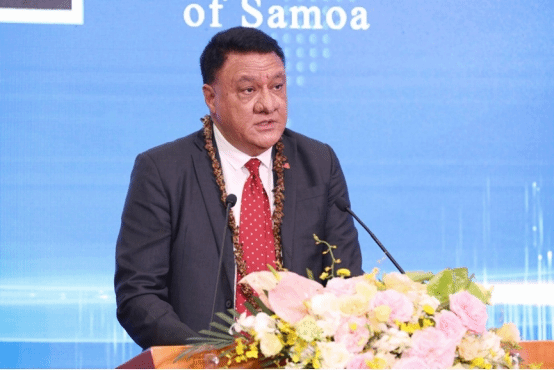
Tapusalaia Toomata spoke
Wang Huiyao mentioned that the promotion of the Belt and Road multilateral cooperation mechanism must uphold the basic principles of extensive consultation, joint contribution and shared benefits. He suggested establishing the Belt and Road permanent institutions, building up governance mechanisms, expanding multilateral cooperation targets under the United Nations framework, strengthening cooperation with international development banks and enterprises, attracting more developed countries to participate, and strengthening Sino-US cooperation. These will contribute to a more sustainable development of the programme.
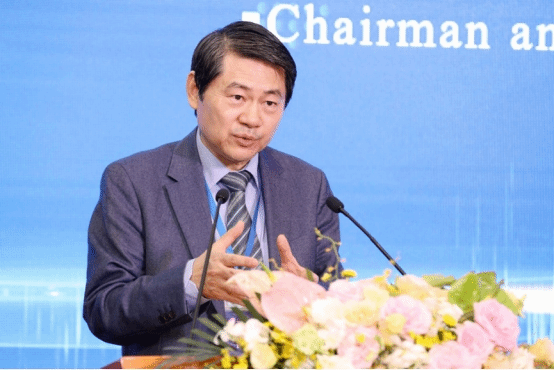
Wang huiyao spoke
The plenary session of this forum was presided over by the vice president of our university Wang Tinghui. Li Xiangyang, director of the Institute of Asia-pacific and Global Strategy at the Chinese Academy of Social Sciences; Giuseppe Crocetti, chief of Mission PRC of international Organization for Migration; Hu Qianwen, former Chinese ambassador extraordinary and plenipotentiary to Vietnam, Cambodia and Bangladesh; Maria, vice president of Sophia University “St. Kliment Ohridski”; Lin Guijun, former member of the Standing Committee of the Party Committee and vice president of the University of International Business and Economics, and scholar in our university; Li Gang, vice president of China Institute of International Trade; Zhang Huarong, member of the CPPCC National Committee, Chairman of Huajian Group; and Joël RUET, chairman of the Bridge Tank, made a speech on the theme of the meeting.

Wang Tinghui spoke
Li Xiangyang considered that the high-quality development of the “Belt and Road” project is occupied with a high standard, concerns of human livelihood, and sustainability. He believed that promoting the construction of regional value chains and institutions is conducive to achieving high-quality development and effectively coping with external pressure. Meanwhile, it was also necessary to follow the principle of mutual consultation, of gradual progress, of justice, and of marketization.
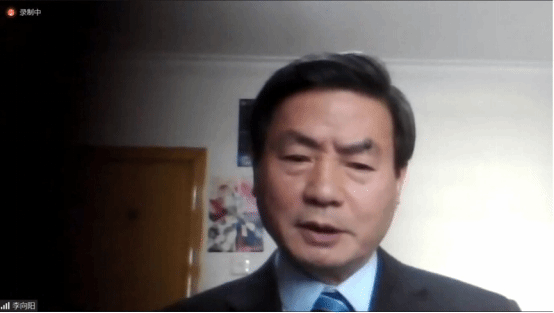
Li Xiangyang spoke
Giuseppe Crocetti mentioned that immigration has a key contribution to make to economic growth, social development, and sustainable development. He said The Belt and Road initiative has opened up new trade routes and new trade corridors, bringing employment opportunities and economic development to the associated countries and regions. In the future, countries can strengthen international cooperation to solve the immigration problem of countries along the Belt and Road.
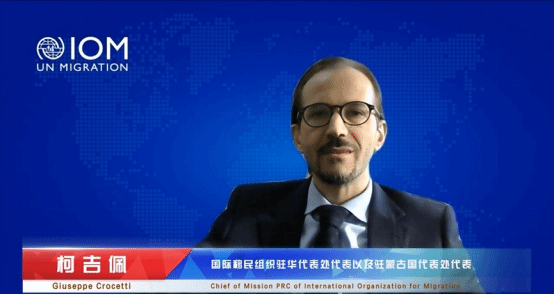
Giuseppe Crocetti spoke
Hu Qianwen said: in the face of the complicated international situation and the arduous tasks of domestic issues, we need to maintain the current international order, reduce misunderstandings and frictions caused by contacts between various civilizations. Friendly and cooperative relations will further strengthen and enhance mutual economic and cultural exchanges.
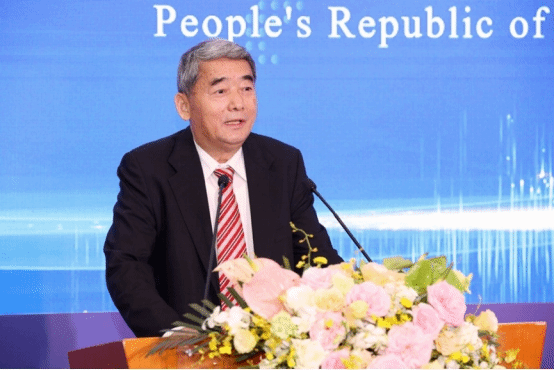
Hu Qianwen spoke
Maria thought highly of the conversation between experts in economy and trade, it is a significant part of EU-China relations. The academic dialogue helped to build mutual trust between Europe and China. Therefore, strategic policies are needed to attract talents. By signing the agreement for this higher education cooperation project, the two sides have established a stable relationship.

Maria spoke
Lin Guijun mentioned that the current level of internationalization of major cities in China needs to be improved. The gap of the domestic tourism trade deficit is large. China is still far away from completing the mission represented by the Maritime Silk Road. He proposed we should further introduce foreign capital, attract international talents, strengthen humanities exchanges, improve the level of friendly exchanges between our country and other related countries, and promote academic exchanges by establishing the "Belt and Road" landmark Maritime Silk Road Friendly Exchange Center.
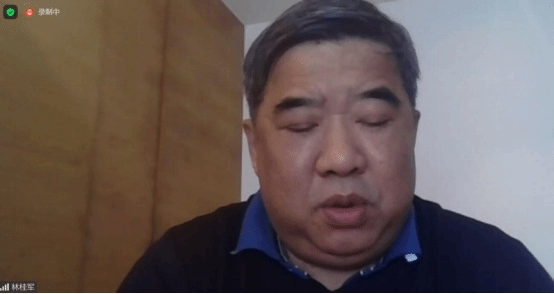
Lin Guijun spoke
Li Gang reviewed the main achievements of the Belt and Road and pointed out that the future development should pay more attention to institutional and institutionalized and joint construction of a dispute settlement mechanism, focus on pragmatic economic and trade cooperation, and focus on benefiting people’s livelihoods. Other goals are to: enhance mutual understanding and trust, pay attention to green development, carry out cooperation in ecological and environmental protection and energy saving and emission reduction, pay attention to the drive of innovation, and strengthen cooperation in the field of scientific and technological innovation.
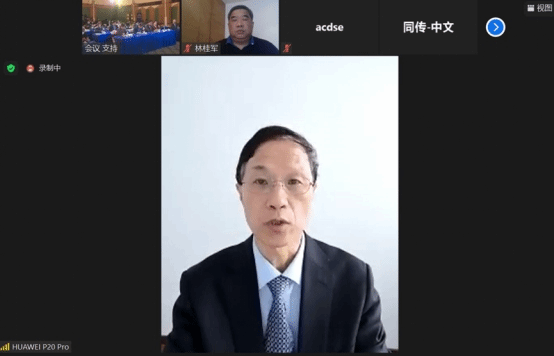
Li Gang spoke
Zhang Huarong shared his experience of investment in Africa and mentioned the contribution that China-Africa cooperation has made to the development of Africa. He considers Africa a potential market. Zhang looks forward to further talent exchange.
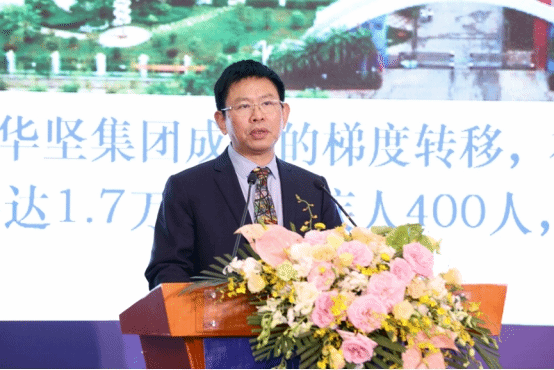
Zhang Huarong spoke
Zhou Rui said: in order to tackle challenges from sustainable development and inclusiveness in the Belt and Road programme, it is necessary to adhere to green development and insist on helping developing countries to promote their long-term development. Also, integrating with the Paris Club also provides a platform to macroeconomic development.
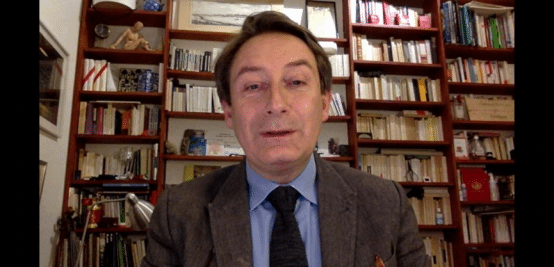
Zhou Rui spoke
This forum also released the "2020 Annual Research Report on the Construction of the 21st Century Maritime Silk Road: Digital Economic Cooperation of One Belt One Road ". The report analyzes the status of digital economy development of the countries along the route, as well as the programme’s achievements in recent years. It also predicts opportunities and challenges that the relevant countries will meet in the future.
Written by: He Vanessa
Photo by: From GDUFS News Website
Edited by: Kyle Muntz, Wang Mengyu

